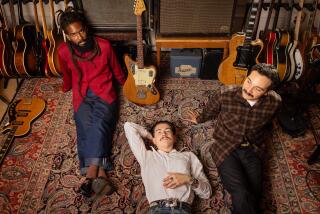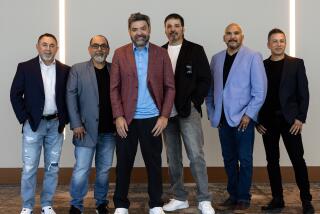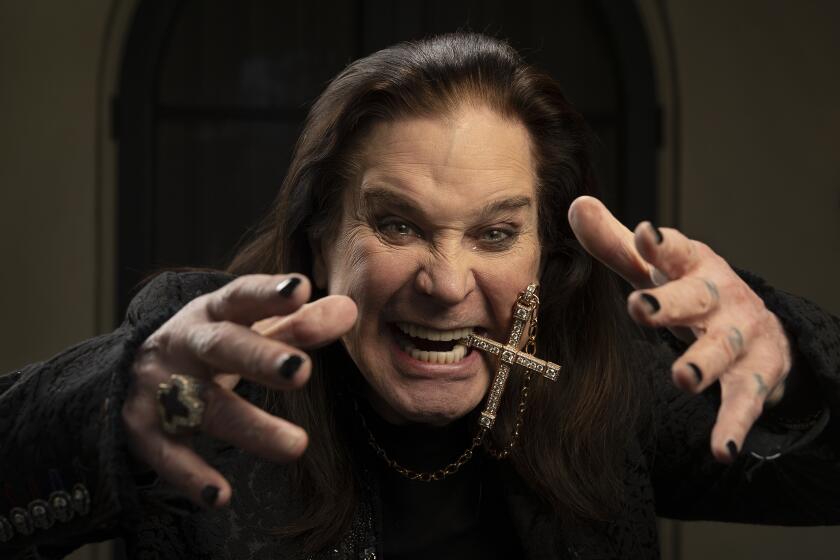Spreading Their Tentacles
- Share via
In today’s fragmented pop-music world, neo-hippie jam bands and electronica acts would appear to have little in the way of common ground. .
The likes of Phish and the Dave Matthews Band relish the communal experience of playing live; the Chemical Brothers and Orbital find their inspiration tweaking knobs in a controlled recording studio environment.
England’s Ozric Tentacles, which plays Wednesday at the Coach House and Thursday at the House of Blues, is one of the few bands striving to bridge that gap.
“I like to think we’re preserving the link between the early prog-rock live scene and the techno-electronica-rave thing,” said keyboardist Seaweed, who declined to divulge his real name during a recent phone conversation from a tour stop in St. Louis. “My excitement as a teenager was hearing bands that used synthesizers, but they were played by artists with a sense of musicality, like [Genesis’] Tony Banks and [Yes’] Rick Wakeman. They had a way of making synthesizers sound beautiful to my ears.”
On its new “Waterfall Cities” album, Seaweed’s ambient, spacey synthesizers co-mingle with group founder Ed Wynne’s snaking guitar parts and softly played flute interludes from John Egan, all grounded by a solid rhythm support of bassist Zia Geelani and the group’s drummer, who also goes by a single stage name, Rad.
The all-instrumental quintet was formed in 1982 out of the British crusty movement, which mirrored America’s hippie movement of the ‘60s.
In the beginning, the group commonly played six-hour sets at free outdoor festivals, where fans camped out and the Ozrics jammed beneath the stars--as well as under the influence of various hallucinogens.
The festival culture soon gave way to the deejay-driven rave scene of the ‘80s, where synthetically produced layers of dance music--that is, reverberating trance and dub grooves--replaced much of the live-music experience.
Though heavily influenced by ‘70s-era British progressive-rockers Hawkwind and Gong, Ozric Tentacles also was intrigued by ongoing developments in technology. In time, the band members came to embrace the burgeoning U.K. electronica scene as a way to evolve and modernize their sound.
*
Constant touring throughout the ‘90s has earned the Ozrics a self-sustaining fan base, at least in Europe. The band hit a commercial peak when its “Jurassic Shift” album climbed to No. 11 on the British pop charts in 1993.
Such popularity has proved elusive across the Atlantic. Before “Waterfall Cities,” only two of the band’s 15 albums were released here--”Jurassic Shift” and “Arborescence.”
The Ozrics are seeking to gain a higher profile with its first U.S. tour in more than five years.
“America has been a hard place for us to conquer, but the atmosphere here is much more positive right now,” he said. “We’re seeing better crowds, mainly because of word-of-mouth and the Internet. There’s a far greater awareness that we’re here.
“It’s funny. A fan told me after one show that he didn’t really know who we were, but because the bulletin board on [our] Web site was going crazy [posting blurbs] about the band, he decided to come check us out.”
Seaweed said that because of advances in technology, the Ozrics are now better equipped to play orchestrated studio pieces live.
“Samplers have gotten cheaper, and now there are data filers that take your sequences and shove them into little discs that you can take onstage,” Seaweed said. “They work like magic. We’re even able to do older, heavier, layered stuff like ‘External Wheel’ and “Sploosh.’ We love technology.”
At the same time, they strive not to become slaves to that technology.
“What’s important is what technology enables you to do musically, where the interface gets better and better so it’s more accessible to the human being,” he said. “Ideally, you can specify more of what you want it to do, rather than being held captive to its agenda. That’s where the real progress is.”
Its technology-assisted jams, which can run as long as 20 minutes, have generated flak from some rock critics.
“We’ve been called self-indulgent by the British press, but I don’t think we are, really,” said group founder Wynne, taking a turn on the phone. “In America, I find myself playing with even more freedom, and really going for it. We play so the audience can get off on the music, and we in turn build from the energy they feed back to us. It’s like a two-way ladder leading to a higher realm.”
Does that climb require mind-altering substances?
“Obviously, there is a psychedelic tradition to what we do,” Seaweed added. “It’s no secret that [our 1990 album] ‘Erpland’ was done in the presence of mushrooms. But we’re older and so busy that it’s not that easy to lead a psychedelic life anymore.
“As for our fans, it really depends on each person’s personality. Some people like the bonus of psychedelics when they’re listening to us, while others prefer not. That said, I’d be very disappointed if you had to be high on drugs in order to enjoy the Ozrics.”
* Ozric Tentacles and Star People play Wednesday at the Coach House, 33157 Camino Capistrano, San Juan Capistrano. 8 p.m. $19.50-$21.50. (949) 496-8930. Also Thursday at the House of Blues, 8439 W. Sunset Blvd., West Hollywood. 9 p.m. $17.50. (323) 848-5100.
More to Read
The biggest entertainment stories
Get our big stories about Hollywood, film, television, music, arts, culture and more right in your inbox as soon as they publish.
You may occasionally receive promotional content from the Los Angeles Times.










